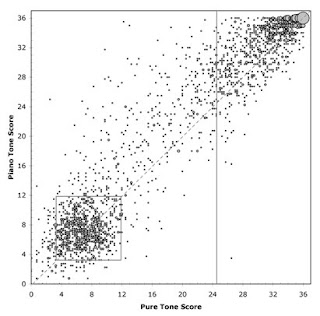I’ve come to think that people who get excited about having perfect pitch are assholes.
Is that too strong?
I mean all my life I’ve been hearing about perfect pitch and how those who have it are these kind of fragile nobility, both blessed with this extra faculty, but also cursed to suffer in a world of cacophony. That’s the obnoxious part. Clearly I have issues with my lack of inherent musical talent, but I don’t feel like I bear a grudge towards those who have it. Most of the time I feel grateful that they’re out there, making music for me to listen to. And to sing along with. Remorselessly off key.
But the whole perfect pitch thing seems extraneous to that.
I spent some time in my life working on auditory neurophysiology, so I know something about sound and how the brain processes it. And there are interesting studies on what is now called absolute pitch. (See? Someone besides me got annoyed with the “perfect” judgement.) The most interesting aspects of absolute pitch are that people either have it or d o NOT have it — there’s very little middle ground. The graph to the right is from the study linked to above. The authors of this study indicate that the probability of scoring above the vertical line by chance alone is about one in a trillion. The middle-ground folks, they theorize, are well-trained and have taught themselves to identify tones. If you’re interested, you can take the survey and test on their site. My pure tone score? 4.5. Right in the upper left corner of that box down in the “don’t have it” end of the graph. Interestingly, my piano tone score was 10, which means my harp teacher managed to teach me something.
o NOT have it — there’s very little middle ground. The graph to the right is from the study linked to above. The authors of this study indicate that the probability of scoring above the vertical line by chance alone is about one in a trillion. The middle-ground folks, they theorize, are well-trained and have taught themselves to identify tones. If you’re interested, you can take the survey and test on their site. My pure tone score? 4.5. Right in the upper left corner of that box down in the “don’t have it” end of the graph. Interestingly, my piano tone score was 10, which means my harp teacher managed to teach me something.
The reasearchers say there’s genetic predisposition — if it runs in your family, you’re likely to have it. There’s also the learning aspect. If you started music lessons by the age of seven, you’re also more likely to have it. And if you have siblings who were taking lessons while you were growing up, you’re even more likely to develop absolute pitch.
A lot of fantasy/magic stories like to tie perfect pitch to magical ability, as if there’s a certain keenness to their minds the rest of us lack. And people like to tie high IQ to absolute pitch. To me though, this is like tying IQ to spelling ability.
I’m a compulsive proofreader. I can’t help it. Misspelled words stand out on the page to me like they’re in bold type. Obviously a lot of this is learned, but I’ve also felt like this is an inherent ability. Kev commented on my words & music post the other day, saying that, as a programmer, he literally can’t read content until he’s first scanned for syntax errors. I also heard of an editor so accustomed to proofing on-screen that, when she first started reading on the Kindle, she found herself compulsively proof-reading.
The thing is, I can’t imagine the book where magic is tied to proof-reading and spelling ability. It’s frankly just not romantic enough. Though I suspect much the same mechanism is involved. Penelope Trunk at Brazen Careerist likes to rant about the tyranny of the proofing-nuts. She even hints that perfect spellers have borderline Asperger’s syndrome and cites a documentary about it. (Interestingly, the absolute pitch survey also asks about family history of Asperger’s syndrome and autism, so maybe there are links.) Certainly no one is going to go around talking about being a tormented soul, bombarded by typos in a perfect world.
Though I sometimes contemplate volunteering to edit the menu at our local Chinese place. So far I’ve resisted. Can’t figure out a way to offer without sounding like an asshole.
Seems like a good behavioral guideline to me.